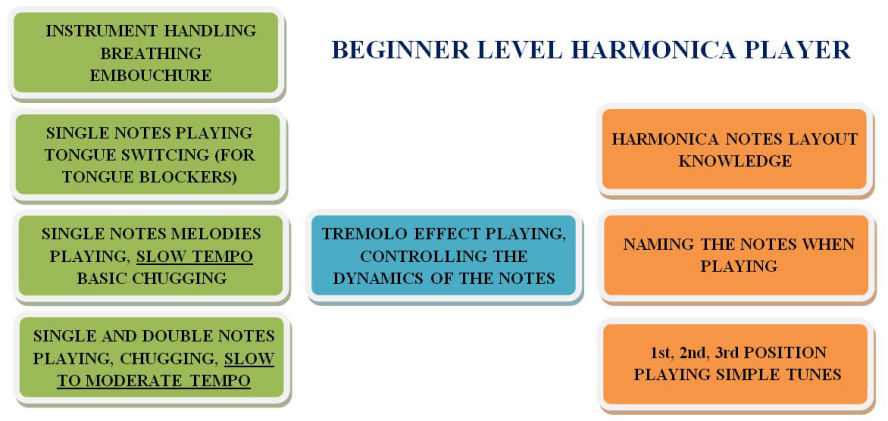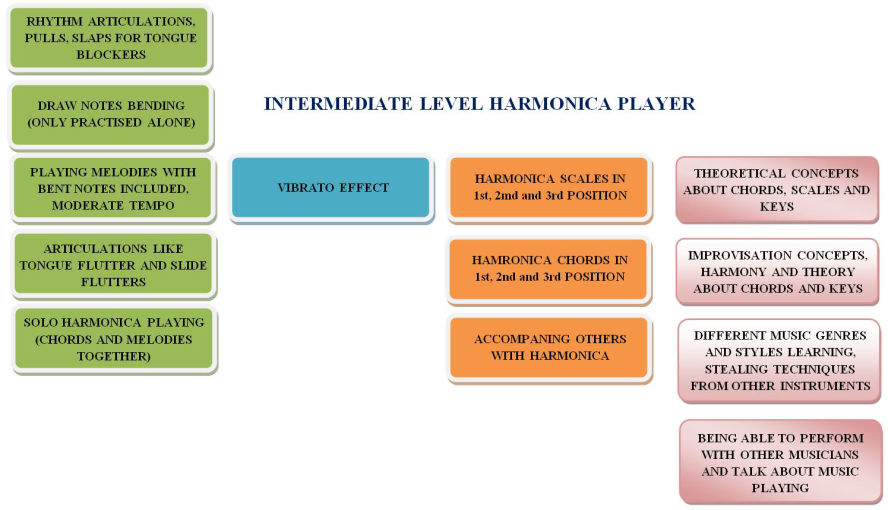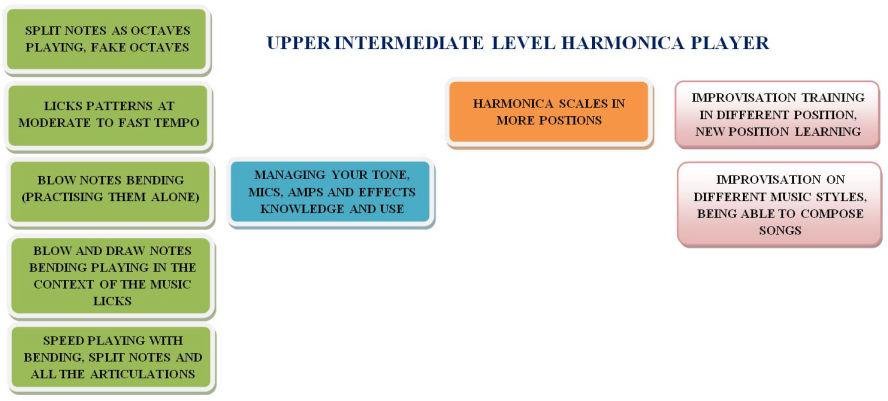What's your harmonica playing skill level? Are you a beginner, an intermediate or an advanced player? Is there a way to measure your skills? In this lesson I'll give you the possibility to check your harp knowledge, presenting to you 15 exercises of progressive difficulty.
When we commence studying harmonica - particularly if we opt to polish our skills to play it without a teacher - we may find ourselves wondering what proportion of knowledge we possess in terms of understanding of our technical abilities we may have for this instrument.
For this lesson you will use a C harmonica.
We're confronted with more or less same queries by our own conscience prior paying for an online course or when we are off to get ourselves enrolled in a music school - although we need to calculate first before selecting any of the option - whether we fall in the category of beginner level students, intermediate or advanced level.
Today additional levels, devised such as 'advanced beginner', 'upper intermediate', etc, have been introduced which further complicate this issue, but where does this lead us anyway?
Let me explain it to you by giving an example: when you are successful in playing the notes on holes 2 and 3 draw, with bending technique, but when it comes to include bending in a sequence of quick notes, you are unable to play it altogether, what's your level, can you play bent notes or not?
Another example: which level would you deem yourself standing on, as a student, if you find the notes on a score easy to read, but at the same time you fail to maintain a steady tempo while you play? Let me share an important aspect as an experienced teacher, that time bound playing is actually a common problem faced by most of the students, even those who have been playing harmonica for many years. If you happen to take any of the courses that I have launched so far, you will noticed that I have made extensive use of the auditory as well as visual metronome in my lessons.
I have created a roadmap showing what skills a harmonica player must acquire over certain period of time; to assist students choose the right course for their advance study of harmonica. This scheme should not be taken as an ultimate choice, but it may be considered as a good starting point to guide learners in selecting and studying a suitable online course.



Let's explore chief areas that require practice, which come into play when we start learning to play the blues harp:
Technical area: you learn how to breathe and hold instrument properly and make effective use of embouchure by applying correct position of tongue when you study 'tongue blocking technique'. The technical area includes all those skills which you acquire to play with dexterity, such as going at tempo, playing musical phrases with multiple speeds, playing split notes or notes with bending and so on.
Knowledge area: this area is often underestimated by the students, especially those who study on their own. When you begin practising to play the harmonica, it's advised to be aware of notes that you play and what position they are located on the instrument so as to play in different positions conscientiously, not to mention, with different keys also. In this area, we familiarize with some theoretical notions relating to scales, chords and note hierarchies. It is important to understand why, at a certain time of execution, we play some specific notes and not the others. For example; knowing, where to locate chords on a harp, may prove to be wonderous in accompanying other singers or players or when playing with a band.
Sound area: in addition to learning to play notes and playing them quickly, you need to develop a good command of tone apprehension, besides being capable of adding effects to the notes such as dynamic control (note volume), tremolo and vibrato. In this area, we also grasp notions relating to harmonica amplification and processing of the sound to achieve a well-defined customizied timbre.
Area of improvisation and composition: here you learn to improvise on different musical genres and get something from each style to add to your very own way of playing. You also learn how to compose songs or to acquire the skills pertaining, in every context, to any type of musician.
By now you must have perceived that studying harmonica isn't just about trying to play sheer 'bending' from day one; it's actually a vast subject and - to learn well and in a faster way - it is convenient to follow a well organized study program gradually, which will ultimately lead you to become a competent and conscious harmonica player.
Follow this lesson and test now your harp playing skills with the exercises. In these exercises we'll use different techniques as bending, tongue blocking articulations and fast licks playing.
The first exercise is quite simple: we just play at a slow tempo some notes on the central instrument area.